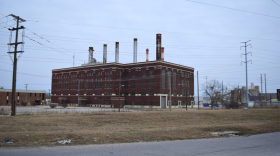Voters passed a constitutional amendment Tuesday that creates the Texas Energy Fund, injecting $10 billion of public money into energy infrastructure, including $7.2 billion for companies that want to build power plants in the state.
But voter approval of Proposition 7 is just the beginning.
Here are a few things to watch for as the state becomes a financier of new power plant projects.
How will the Public Utility Commission of Texas operate as a bank?
The Public Utility Commission of Texas is the agency that’s been tasked with overseeing the fund and doling out the money for power plants and power plant upgrades. That’s a new job for the agency which, until now, has largely concerned itself with regulating utilities and the Texas power grid.
Doug Lewin, an energy consultant who writes the Texas Energy and Power Newsletter, says the PUC — long underfunded by state lawmakers — has its work cut out for it.
“This is an agency that is stretched to the breaking point and now they're going to need to manage a $10 billion grant and loan fund,” he said. “I'll be watching how they manage that and if the Legislature appropriates more money.”
Will the plan actually spur investment in natural gas power plants?
Most of the money distributed by the Texas Energy Fund could, technically, go to finance so-called “thermal” power plants, including coal and nuclear generators. But most of the lawmakers who championed the idea intended it to specifically incentivize building natural gas power plants, which, they say, will make for a more reliable electric grid.
Whether it will accomplish that is another question.
“I don't think we'll see any new net additions to the portfolio [of Texas gas power plants],” Ed Hirs, an energy economist and lecturer at the University of Houston, said. “Maybe one or two of the generator companies will take old units and scrap them and use some of this money to build new ones, but I don't expect to see a net gain.”
Hirs said he doubts the effectiveness of the incentive program because it does not overturn underlying realities in the Texas energy market that make building new power plants a risky bet for investors.
Either way, he said, it will be years before we know what affect the incentives had considering how long it takes to finance and build new power plants.
“It's two to four years away before it can really bring any relief to the Texas consumers in terms of [grid reliability]," he said.
What will happen with the public’s money?
Much of the money doled out under Proposition 7 will take the form of low-interest loans to power companies. That means the state hopes to recoup its initial investment at some point.
Lewin is not so confident that will happen.
“Presumably the taxpayer money is going to be paid back to the state over 30 to 40 years,” he said, estimating the operational life of a new power plant. “That default risk is very high.”
He points out that advances in energy technology, the transition away from fossil fuels and a growing push to tackle climate change have many financiers wary of investing in natural gas power plants.
Those same factors could leave gas plants constructed today unable to turn a profit or pay off debts in the future.
And that’s not all
Proposition 7 doesn't just incentivize building new power plants. The Texas Energy Fund will also support energy resilience projects and overhauls to the power grid outside the Electric Reliability Council of Texas' jurisdiction.
Read more about what the creation of the Texas Energy Fund hopes to accomplish here.
Copyright 2023 KUT 90.5. To see more, visit KUT 90.5. 9(MDA4OTAxNzAzMDEzMjc0MTc2MzA5ZDZlMw004))








